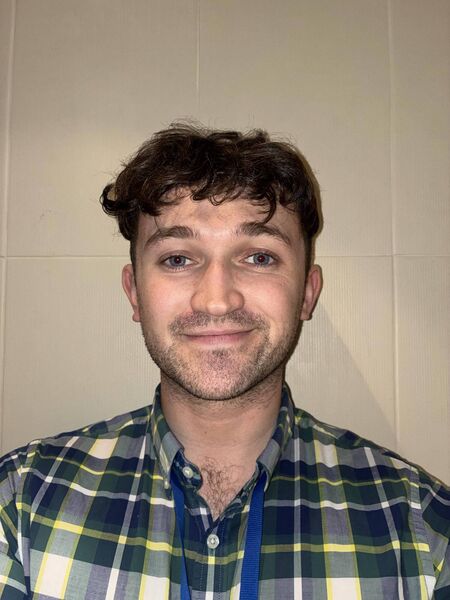Movember: 'There is relief once you reach out for help'

Nabil El Massry has urged men to seek help if they are experiencing mental health challenges.
The sad reality of premature male deaths in Ireland was recently laid out in a report conducted by the Movember Institute of Men’s Health in collaboration with the Men’s Health Forum in Ireland (MHFI) and published last month.
Their analysis shows that 7,453 males died prematurely in Ireland in 2022. That is the equivalent of 40.2% of all male deaths and the leading cause of premature death were cancers, diseases of circulatory system, respiratory system diseases, digestive system diseases and external causes of injury and poisoning, including accidents and suicides.
Premature death is 40% higher among males than females and this gap has remained relatively consistent over time. Furthermore, men living in the most deprived areas of Ireland are expected to live five years less than men living in the most affluent areas and are nearly 1.5 times more likely to die prematurely.
The report shows how men’s physical and mental health impacts, not only individuals, their families and communities, but the social fabric of Irish life as a whole. Drawing on commentary from GPs, caregivers, individuals and others, it is clear from the research there is a need to talk about the issues men face in a more open forum.
When it comes to mental health, two out of five people believe that men’s mental health in Ireland is getting worse. In 2022, 79% of all deaths by suicide were male. On average, GPs reported assessing or treating 14 males per week for mental health issues and this was most common among the 18-34 and 35-54 age groups.
But there are barriers to accessing this treatment too, and one in five GPs have reported rarely screening male patients for depression, the main barriers being the stigma of seeking help, social norms relating to self-reliance, independence, lack of support networks and the fear of negative consequences impacting career.
The spoke to two young Mayo men, both students, about their ongoing mental health journeys, seeking the support they needed and the positive impact this has had upon them.
Kian Sweeney, aged 24, from The Neale, is currently studying psychotherapy in Galway while Nabil El Massry, aged 26, hails from Westport but is currently living in Galway where he is undertaking a master’s programme to become a physician associate and works part time as a senior social care worker.
Kian grew up in a rural part of south Mayo and has dealt with mental health challenges since a young age.
“There was no big trigger for this really, it was just something I suffered with. I grew up on a farm and it wasn’t that I couldn’t talk about things, it was just that it never occurred to me that it was something you could do,” he said. “I knew it since I was 12 or 13 and I was reluctant to go to counselling initially. It feels clichéd to say it but there is a stigma there and I was aware it was something that not everyone was doing.”

Kian is passionate about the need to make mental health supports more accessible, open and free of stigma. Although there are differences in the age-standardised rates of male premature death between Galway, which is on the lower end of the scale, and Mayo, which has the third highest, Kian said there are still challenges in accessing services in the city.
“It’s clear that things aren’t as good as I thought they were in terms of access and I don’t think we’re as ahead as we like to give ourselves credit for in this country,” he said. “Services are more accessible but unless you’re willing to go privately, it is still not very accessible. I don’t think there are enough services, there are probably hundreds of councillors working in Galway city but getting one is another story and the waiting list is always getting longer.”
For Nabil, “a perfect storm” of issues in his life as a teenager led to struggles with his mental health.
“In the years before my Leaving Cert, I had a strong social circle but then friendships shifted, family dynamics changed and being half-Irish and half-Egyptian, I had always felt different from my peers.
“My routines kind of slipped with poor sleep, a poor diet and the stress of school and as a result, my schoolwork suffered. Back then I thought I was just stressed about exams but really I was dealing with a lot of big changes that can all creep into your mental health.
“Looking back now, I think at the root of it was growing up too quickly and feeling like I had to have it all figured out when I didn’t really. In school, there was a lot of talk of college and needing to have it figured out. It was a perfect storm of pressure. It wasn’t a personal weakness, it was just an awful lot for one person to juggle at one time.”
Unlike Kian, Nabil did not feel any stigma about going to his GP to seek support but admits he was one of the few, rather than one of the many.
“I definitely didn’t feel any sort of shame about going to a GP or seeking professional help but I’m of the few rather than the many. I did go to my GP and was referred for support but when I did, I felt unheard.
“I would open up about things but still felt like I wasn’t getting the help. Movember’s report showed that only 14% of GPs were very confident in supporting men who were suicidal. The situation is stressful for them too.
“I think a reason why I am one of the few who felt confident to do that in the first place is that there are still many social norms men have to face, such as toughing it out and cliches like men needing to talk more. Even when they do, the services aren’t built around men’s needs I think that’s why so many feel discouraged and end up falling through the cracks.”
The two men can see changes taking place in this area with culture shifts around the topics of men’s mental health but also in encouraging people to pursue careers in this area.
“If there was less of a stigma, there would be more interest to work in this industry as well,” said Kian. “I think that would go a long way towards solving the supply and demand issues.
“People don’t grow up saying they want to work as a therapist, they say they want to be a nurse or a doctor."
Nabil adds: "We talk about talking more but I think we should shift the focus from fixing men to changing the culture around men. It’s about having good workplaces for families, good communities and healthcare systems.
“While part of that is the individuals responsibility, we have to meet them halfway with real support. We all have friends, brothers and fathers. Men should be able to talk about things more and people should be able to ask more.”
Both Kian and Nabil feel as though they are in a much better place now and have urged anyone reading this article to take that step to deal with their mental health.
“Once you reach out and talk to someone, there will be a relief you can really feel,” said Cian. “It sounds clichéd or wishy-washy to say just to talk about it but you will feel better and reaching out is half the battle.
“Once you get over the initial stage of doing something about it, you get a real bug for it to keep going through it and getting to the bottom of whatever is going on."
Nabil adds: “My advice is, please don’t give up. There are good supports out there, but like anything worthwhile, sometimes you have to try more than once to find what fits. I know from experience that you can come out stronger, and life can get better.
“Three-quarters of Irish adults are worried about men’s health so you’re not alone in this struggle, keep going and don’t stop at the first ‘no.’ The right support is out there and you’re worth finding it.”
Kian and Nabil have both fundraised for Movember and are enthusiastic about supporting men’s health.
“I’m doing really good now,” said Kian. “I still go to counselling as part of my course but I feel like I’m in a much better place. Sometimes we look at mental health as something to be cured, which is very black and white but it is something you have to keep attending to.”
Nabil says he is "doing fantastic" and has a "great lifestyle".
“I try to speak openly and that is all thanks to the social circle around me, how supportive the people around me are and how open I try to keep things with them, genuinely probing that bit further.
“Ultimately, I try to be the kind of voice I wish I heard and had when I was younger.”





